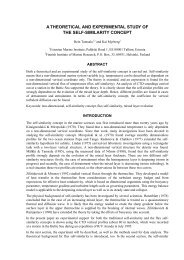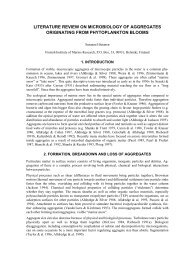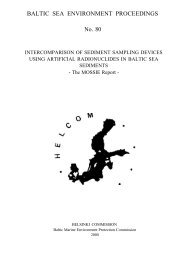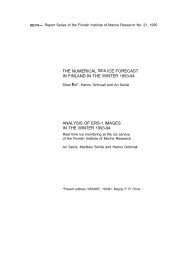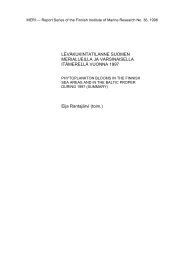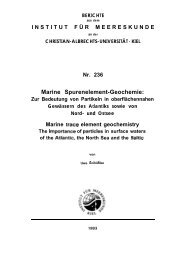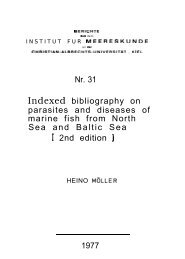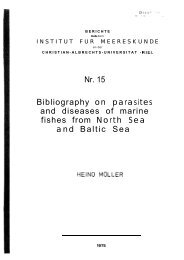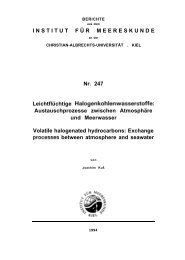marine research in finland - Baltic Marine Environment Bibliography
marine research in finland - Baltic Marine Environment Bibliography
marine research in finland - Baltic Marine Environment Bibliography
You also want an ePaper? Increase the reach of your titles
YUMPU automatically turns print PDFs into web optimized ePapers that Google loves.
The M<strong>in</strong>istry of Education has issued on directive that large <strong>research</strong> programmes should be<br />
developed <strong>in</strong> F<strong>in</strong>land <strong>in</strong> such doma<strong>in</strong>s as are of importance to society. It would thus be difficult<br />
to get money for smaller projects - the money would be marked for special doma<strong>in</strong>s, When an<br />
essential share of the money has been earmarked <strong>in</strong> that way, scientific competition between the<br />
applications will be weaker. Also new scientific doma<strong>in</strong>s and <strong>in</strong>novations will not easily arise.<br />
These designs by the M<strong>in</strong>istry of Education should be strongly critisized.<br />
The Academy of F<strong>in</strong>land has to follow the directives given by the M<strong>in</strong>istry. The university <strong>in</strong>stitutions<br />
and governmental <strong>research</strong> <strong>in</strong>stitutes have to create large projects which should <strong>in</strong>clude<br />
scientists and pre- and postgraduate students from different <strong>in</strong>stitutions, different universities<br />
and also scientists from abroad. This will probably be a prerequisite for support. However, <strong>in</strong><br />
F<strong>in</strong>nish <strong>mar<strong>in</strong>e</strong> science great <strong>in</strong>ternational projects are possible and have been then a normal activity<br />
for many years.<br />
The reorganization of the Academy of F<strong>in</strong>land starts <strong>in</strong> 1995. The Research Council for Natural<br />
Sciences has been abolished. Mar<strong>in</strong>e science and limnology are dealt with by different councils.<br />
Physics, chemistry and geophysics belong to the Research Council for <strong>in</strong> Natural Sciences and<br />
Technics. Ecology and <strong>mar<strong>in</strong>e</strong> biology, <strong>in</strong> the Research Council for the <strong>Environment</strong> and Natural<br />
Resources, have to compete for money with e.g. agriculture, forestry, architecture and the<br />
plann<strong>in</strong>g of society. This reorganization does not seem at all good for biology. This is not the<br />
first time <strong>in</strong> F<strong>in</strong>land when a function<strong>in</strong>g organization is not permitted to be improved by small,<br />
practical changes. Once aga<strong>in</strong> a function<strong>in</strong>g organization is abolished and a totally new organization<br />
is planned. There is no certa<strong>in</strong>ty that the new organization will work effectively.<br />
Which are the essential problems to be supported <strong>in</strong> <strong>mar<strong>in</strong>e</strong> biology<br />
Of course there are a lot of scientific problems, but concern<strong>in</strong>g <strong>mar<strong>in</strong>e</strong> biology the answer could<br />
be the follow<strong>in</strong>g: an understand<strong>in</strong>g of the structure, function and regulation factors of the <strong>mar<strong>in</strong>e</strong><br />
ecosystem. This is real basic <strong>research</strong> hav<strong>in</strong>g on essential value <strong>in</strong> application. Included <strong>in</strong> this<br />
aim are also the analysis of the carbon cycle <strong>in</strong> the sea, the material budgets and the construction<br />
of an ecosystem model. These studies will provide the basis for plann<strong>in</strong>g the protection of the<br />
sea areas.<br />
There are still great gaps <strong>in</strong> our knowledge of the <strong>mar<strong>in</strong>e</strong> ecosystem, for <strong>in</strong>stance:<br />
0 the nitrogen cycle, especially denitrification<br />
• the amount of energy channelled through the microbial loop to higher trophic levels<br />
b the coupl<strong>in</strong>g between pelagic and benthic subsystems<br />
0 the role of mesozooplankton <strong>in</strong> the regulation of pelagic community<br />
• the coupl<strong>in</strong>g of pelagic processes with hydrodynamics<br />
. the <strong>in</strong>teraction between the open sea and coastal areas<br />
These projects are multidiscipl<strong>in</strong>ary, and a prerequisite is advanced <strong>research</strong> groups and knowhow.<br />
The results will have considerable application value. In order to <strong>in</strong>crease the scientific<br />
know-how, <strong>in</strong>ternational contacts will be essential. In the future <strong>in</strong>ternational projects supported<br />
by the EU must be the goal.<br />
In current <strong>research</strong> on the <strong>mar<strong>in</strong>e</strong> ecosystem, the basis has been the analyses of certa<strong>in</strong> processes<br />
us<strong>in</strong>g experimental methods. Part of them can be performed on board <strong>research</strong> vessels, part of<br />
them are better done at the field stations of the university. In this connection there are good opportunities<br />
for creat<strong>in</strong>g coord<strong>in</strong>ated <strong>research</strong> projects between the universities and governmental<br />
<strong>research</strong> <strong>in</strong>stitutes. Fortunately, such projects have already been work<strong>in</strong>g for several years.<br />
Coastal field stations such as e.g. the TvBrm<strong>in</strong>ne Zoological Station are well adapted to monitor<strong>in</strong>g<br />
the state of the <strong>Baltic</strong> Sea. There a lot of <strong>in</strong>terest is directed towards littoral <strong>research</strong>.<br />
Changes <strong>in</strong> the status of the open sea area are <strong>in</strong>dicated as changes <strong>in</strong> the structure and processes<br />
of the littoral ecosystem of the outer archipelago zone. It is important that the coastal <strong>research</strong><br />
stations of the universities take part <strong>in</strong> the <strong>in</strong>ternational monitor<strong>in</strong>g of the <strong>Baltic</strong> Sea.<br />
43



